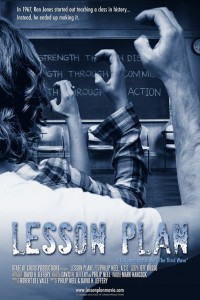The Seattle International Film Festival is quite solid at producing at least one documentary a year which will shock the shit out of you and leave you grasping your arm chairs, head a-swirl at the information being transmitted across the screen. Perhaps there is one amongst the laundry list of documentary films SIFF has to offer this spring during the 37th festival that is of a more gut-wrenching nature, but my adventures through witnessing a press screening of Lesson Plan, directed by David Jeffrey and Philip Neel, gives me reason to believe this may be that very documentary. I recall being similarly shocked and alarmed by a film titled We Live In Public which played SIFF in 2009, in how such raw, unthinkable images were flashing before my eyes, and the direct account unfolded from its immediate sources. Lesson Plan proved for me a well worth first film at this year’s festival, and has set the bar high.
Its subject at hand surrounds the occurrence of a high school teacher in Palo Alto, California, in April of 1967, who gave his sophomore World History class at Cubberly High School a first hand account in a lesson on fascism. Ron Jones, the “master general”, figured this was the most accurate way to guide his class toward completely understanding the atrocities brought onto Europe by the Nazi Party, after they (the students) had professed disbelief that an entire nation of people could possibly be manipulated into committing such horrendous crimes against humanity. Through a series of lectures on discipline, that included creating a movement called “The Third Wave”, rigid means of respecting authority, blacklisting fellow students (those involved with the organization, and even those not), physical stances and salutes to show your pride, and even an increase in members (from 40 to nearly 200 in 5 days), the seemingly harmless project turned into something more ugly, and real. The day before the experiment ended, Ron Jones proceeded to take it another step, leading his cult to believe they were part of an actual student organization that spread across the States from Chicago, to San Francisco, to New York City even. The next day, the students were to assemble at a lecture hall and witness their leader express on national television that he was therefor running for Presidency, with the idea to overtake democracy.
The results from their discovery that there is no such leader is tremendous, emotional, and harrowing. As the film is rich in actual testimony from more than half a dozen students part of the movement (and even one who was excommunicated within the first two days, leading to an equally riveting subplot regarding her secret resistance plan of attack), Ron Jones himself, the school Principal at the time, and members of the community and school board, you receive the full picture in order of sequence, giving you a thorough explanation as to its initial purpose and the events leading up to its ultimately explosive conclusion, filled with mad passion, and an eerie silence that nearly brought me to tears, it was so surreal and fragile a situation. Another unique source of philosophy for the film is Dr. Philip Zimbardo, the creator and facilitator of the Standford Prison Experiment, whose equally disturbing results would make a worthy follow-up documentary for Mr. Jeffery and/or Mr. Neel to embark on. His ideas behind human behavior segue us into the film with a proper uncomfortable feeling that makes the experience all the more exhausting, and entertaining. One also is reminded, though not from any direct interview in the film, of the infamous Milgram Experiment in 1963, which was an organized experiment at Yale University testing obedience in average American adult males (later experiments would play around with different ages, genders, cultures, etc…), resulting in terrifying percentage rates in how many volunteers went to the most extreme level of being controlled by a figure of authority.
What I took from this film is nothing I wasn’t aware of entirely before, if we’re talking message: Fascism is awful. It has happened before, been proven since that it is capable to happen even here in the United States, and there is a chance even in the generation of information, that it could happen again. To think how sneaky people can be in their presentational manipulation is alarming, as was the case for many of Mr. Jones’ own students whose disbelief in how in the course of five days their sense of self independence would be tossed aside so casually left dramatic marks on them to that exist to this very day. But the story itself, as I noted before, is so bizarre and on paper sounds so unreal, the film naturally succeeds in it’s dramatic intensity.
Who would I recommend it to? Anyone who likes a juicy piece of nutty American history, particularly in a high school setting, amongst the height of the crisis in Vietnam. It isn’t necessarily one of the films I’d imagine would have otherwise been highly toted here in the Seattle Gay Scene, but it could very likely be the only film I see this festival thanks to my work schedule, and I figured it was worth getting the word out. It plays at the Harvard Exit on May 31 at 7:00 pm and again on June 1 at 4:30 pm. Tickets are available to purchase in advance by logging onto www.seattlefilm.com, or by calling 206-464-5830.













